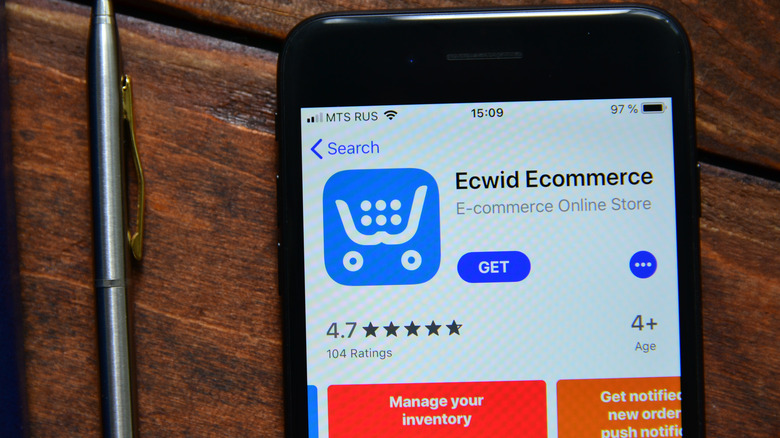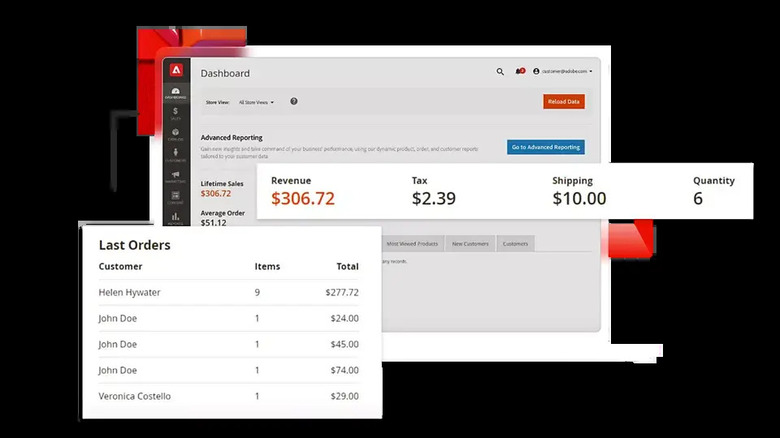5 Of The Most Popular Alternatives To Shopify You Can Use Right Now
In the modern digital age, burgeoning businesses need a reliable means of marketing themselves to the wider world. Of course, if you're an entrepreneur just starting out, you probably don't have the capital available to build an entire e-commerce system from the ground up, nor staff it with the tens or even hundreds of staff necessary to run a major operation. We all have to start somewhere, which is why there are services like Shopify that give you a running start.
Shopify is a subscription-based e-commerce platform that can handle a big chunk of your online business logistics needs, including website creation, inventory management, product pricing and shipping, and more. It's a helpful service, but depending on your precise e-commerce needs, the sheer scope (and price) might be a tad excessive. If Shopify doesn't quite ring the right bells for you, don't worry — there are various other e-commerce platforms out there that cater to more specific niches, needs, and price ranges. These services are backed up by the recommendations of accredited business and software publications, which we'll go into more detail at the bottom of the page.
Ecwid is good for starting small
Let's say you're starting at complete zero with your new business. You've got very few products to sell and little to no money to burn on building an online storefront. If you're looking to start exceptionally small, Shopify's scope and pricing might not work out for you. In such a case, the e-commerce widget, better known as Ecwid, can help you get some building blocks in place before you decide to scale things up.
Ecwid is the quintessential beginner's e-commerce platform. The base package is completely free, and the initial setup process is nice and simple. Ecwid can be used to create a simple website from scratch, though you can also use it to integrate a storefront into an existing content management system. Of course, the free package doesn't give you a lot of support, and if you make a storefront, you'll only get a single web page. There are paid packages for more advanced features like social media integrations, with prices starting at $15 per month.
Katherine Haan and Cassie Bottorff of Forbes gave Ecwid a 4.6 out of 5 score in their review, praising the free plan option and the platform's easy integrations with other platforms. They do caution, though, that there are some e-commerce situations where Ecwid's free package might fall short, such as making a more elaborate website with multiple pages.
BigCommerce is for shipping large quantities of product
One of the tricky aspects of building an e-commerce system for yourself is inventory logistics. Even if you don't sell that many individual products and variations, if you're planning on shipping out a large quantity of one thing, that's still several spreadsheets worth of information and orders you need to keep track of. If you're specifically planning on moving around large amounts of products, a volume-oriented platform like BigCommerce may be a little more your speed.
As the name implies, BigCommerce's primary selling point is its volume management. It's got a wide array of features and systems available right out of the box, including support for marketplace listings, automated shipping, and sales tax calculation. It's also got lots of consumer-friendly options like coupons, discounts, and gift card support. All in all, BigCommerce is an ideal option if you've already got a storefront but want to scale it up and really start moving some product.
Christine Organ of Forbes scored BigCommerce at a 4.3 out of 5 in the publication's review. She particularly liked support for systems like single-page checkout and real-time shipping quotes, as well as platform support like 24/7 agents and multiple inventory locations. However, BigCommerce is definitely not designed for beginners, and some of the plans have annual revenue limits.
WooCommerce is designed for WordPress websites
If you've made a website for yourself in the last ten years or so, there's a good chance you did it with WordPress. WordPress remains one of the most popular website-building platforms out there thanks to its relatively simple design and regular new additions and integrations. If you've already got a website for your business that is built with WordPress and you would rather not have to migrate it over to a new platform, you might like WooCommerce.
WooCommerce condenses just about everything you'd need for an e-commerce setup into a single WordPress plugin. Downloading and using WooCommerce is free of charge, though you will need to pay for things like hosting, domain names, and so on. WooCommerce offers support for 140 different payment methods, and since it's WordPress-based, you can use any existing WordPress resources to build and dress everything up to your liking.
WooCommerce has amassed a user score of 4.4 out of 5 on business software aggregator G2. Users appreciate the inclusion of features like product, shipping, and payment management, as well as the overall ease of integration into an existing WordPress site. The only major downside users cite is that you may need to obtain or purchase other WordPress plugins to maximize its functionality, which could become expensive.
SquareSpace can give your store a bit of style
One of the tricky aspects of building a digital storefront for yourself is making it visually distinct and appealing. User-friendliness is important, of course, but you can't discount the vital importance of good aesthetics either. You want people to come to your store and think, "This is a good-looking store, I feel confident about shopping here." Toward that end, if you want to give your online store a bit of the old razzmatazz, SquareSpace could be what you're looking for.
SquareSpace is an e-commerce platform packed with features designed to make your website as seamless and visually appealing as possible. It's packed with all kinds of aesthetically pleasing designs and templates for you to utilize, as well as features like integrated blogging for communicating with users. All of this is managed via a simple drag-and-drop building and editing interface. Even if you don't know much about website building or design sensibilities, SquareSpace can help you put something professional-looking together.
Jeffrey L. Wilson and Jordan Minor of PC Mag gave SquareSpace a 4 out of 5 score in their review of the platform. While they were somewhat disappointed by the lack of a free package and no phone-based customer support, they were impressed with the platform's intuitive interface, convenient e-commerce integrations, and built-in customer analytics tools.
Magento is open source for greater customization
If you know a thing or two about coding and web design, that can definitely aid you in any website and e-commerce endeavors. Of course, you still have to actually put a website together, which can be a chore even if you have the know-how. If you have experience with open-source systems, perhaps that knowledge could be better put to work for you with the help of Magento.
A spin-off of Adobe Commerce, Magento is a completely open-source e-commerce platform with a community of users providing coding and design support from the background. With the help of user-made code and plugins, you can add just about any kind of function to your website that you would want piecemeal, leaving out anything you don't consider important. Magento also comes with an extensive network of third-party add-ons, so you can add support for various payment types, marketplaces, and more.
Software review aggregator TrustRadius has given Magento a score of 8.8 out of 10 based on user reviews. Users enjoy the large and helpful community, as well as the modularity that comes with an open-source platform. They do caution, though, that back-end coding knowledge is a requirement for use, and the learning curve can be very steep.
There are plenty of options available with solid recommendations
No matter what kind of e-commerce platform you're looking for (Shopify notwithstanding, obviously), there will be at least one out there that can fit your particular niche. To help you pick one, we gathered the preceding platforms based on either reviews from accredited business and software publications like Forbes and PC Mag, or user review aggregates from sources like TrustRadius and G2.






